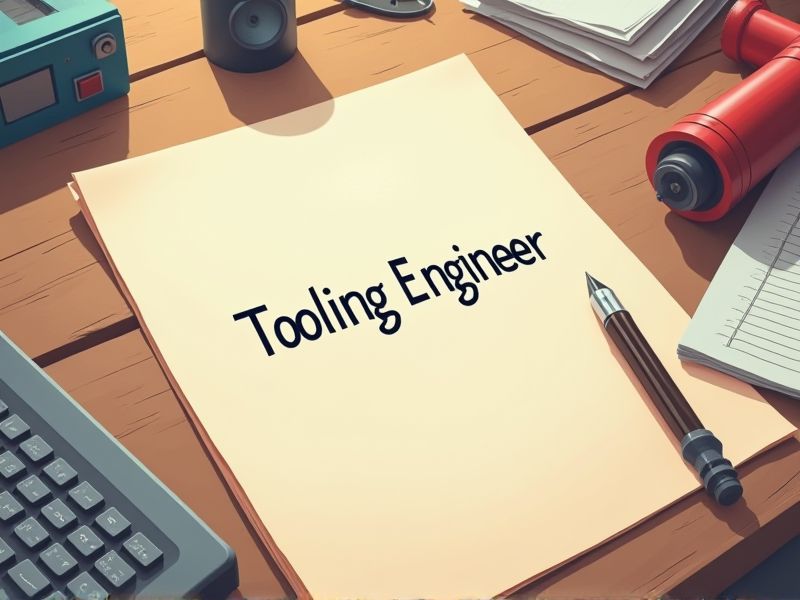
Tooling Engineers require specific certifications to ensure they possess the technical skills and knowledge needed to handle complex machinery and production processes. Certifications validate their expertise in critical areas such as design, manufacturing, and maintenance of tools and equipment. They also enhance credibility, making engineers more attractive to employers seeking qualified professionals to maintain efficiency and innovation. Here are some essential certifications you might consider for a career as a Tooling Engineer.
Certified Tooling Engineer (CTE)
A Certified Tooling Engineer (CTE) enhances credibility by standardizing expertise and validating skills in the field. This certification often leads to higher pay and progression opportunities, as employers recognize the increased value of certified professionals. The CTE designation fosters a deeper understanding of advanced tooling techniques and industry standards, which reduces errors and increases operational efficiency. Credentialed engineers are more likely to stay updated with the latest technological advancements, resulting in innovative solutions and improved project outcomes.
Certified Manufacturing Engineer (CMfgE)
A Certified Manufacturing Engineer (CMfgE) enhances a tooling engineer's proficiency in advanced manufacturing processes. With CMfgE certification, tooling engineers gain vital insights into contemporary production methodologies, increasing efficiency. The certification arms engineers with the ability to implement cost-effective strategies, reducing waste and errors in tooling design. This credential ensures a higher standard of industry compliance, ensuring projects meet necessary regulatory requirements.
Six Sigma Green Belt Certification
Obtaining a Six Sigma Green Belt Certification equips a tooling engineer with advanced problem-solving skills, enhancing efficiency and precision in tool design and production processes. The certification provides a structured approach to identifying defects, leading to improved product quality and reduced waste. Mastery of Six Sigma methodologies enables a tooling engineer to streamline operations, significantly lowering costs in manufacturing environments. The credential signals expertise and commitment to continuous improvement, increasing career advancement opportunities within the industry.
Six Sigma Black Belt Certification
Six Sigma Black Belt Certification equips tooling engineers with advanced problem-solving skills, enhancing efficiency in manufacturing processes. The certification provides a framework for reducing defects, leading to increased product quality and customer satisfaction. It facilitates better resource management, which can lower operational costs and drive profitability. Moreover, the certification enhances career development opportunities by validating proficiency in quality management techniques.
Lean Manufacturing Certification
The Lean Manufacturing Certification provides tooling engineers with critical skills to improve production efficiency and reduce waste. With this certification, engineers gain analytical tools to identify and eliminate bottlenecks in the tooling process. It fosters a mindset focused on continuous improvement, leading to higher quality and cost-effective outcomes. Companies recognize certified professionals as valuable assets, often leading to better job opportunities and career advancements for tooling engineers.
Certified Quality Engineer (CQE)
Tooling Engineers often deal with complex manufacturing processes, and a Certified Quality Engineer (CQE) can enhance process efficiency by implementing quality standards. Having a CQE ensures that the tooling designs meet customer requirements and regulatory standards, reducing risk of non-compliance. Quality Engineers bring analytical skills that can help identify and resolve potential flaws in tooling designs before they result in costly production errors. By integrating quality control early in the design process, CQEs contribute to cost savings and improve product reliability.
SolidWorks Professional Certification
A SolidWorks Professional Certification demonstrates a tooling engineer's proficiency with essential design and modeling software, which can enhance their capability to create precise and efficient tool designs. Employers often seek certified professionals since it signals a standardized level of expertise and can lead to increased employability. The certification ensures a tooling engineer stays updated with the latest software features and best practices, crucial for innovation in tool design. It can also provide a competitive edge when seeking career advancement or higher salary opportunities within the industry.
Autodesk Certified Professional (AutoCAD)
Achieving Autodesk Certified Professional (AutoCAD) status demonstrates the tooling engineer's proficiency with AutoCAD, which aids in designing precise and complex tool components. Certification often enhances a tooling engineer's credibility, leading to increased job opportunities and career advancement. Employers may require this credential to ensure consistent and efficient use of AutoCAD for meeting project specifications. As a result, certified professionals may contribute to reduced design errors and increased productivity in tooling applications.
GD&T Certification
GD&T Certification ensures a tooling engineer understands complex dimensioning, improving design accuracy. Without it, misinterpretation of tolerances can lead to production errors and increased costs. Proficiency in GD&T fosters better communication with cross-functional teams, ensuring precise manufacturing. A certified engineer reduces waste and enhances efficiency by applying standardized practices aligned with international standards.
Advanced CNC Programming Certification
Advanced CNC Programming Certification equips tooling engineers with the specialized skills to handle complex machining tasks, enhancing precision and efficiency. With such certification, engineers gain a deeper understanding of machine tools and software, leading to reduced downtime and improved production quality. In an industry where technological advancements rapidly evolve, certified individuals stay competitive and relevant in their roles. Enhanced programming capabilities translate to more innovative solutions, driving company growth and operational optimization.
Summary
With certifications, you can expect to enhance your technical skills, leading to increased job performance and efficiency. This improvement often results in greater recognition from employers, potentially opening doors to advanced career opportunities or promotions. Certification also generally provides you with a competitive edge in the job market, making you more attractive to prospective employers. Confidence in your capabilities often grows, positively impacting your job satisfaction and professional development.
